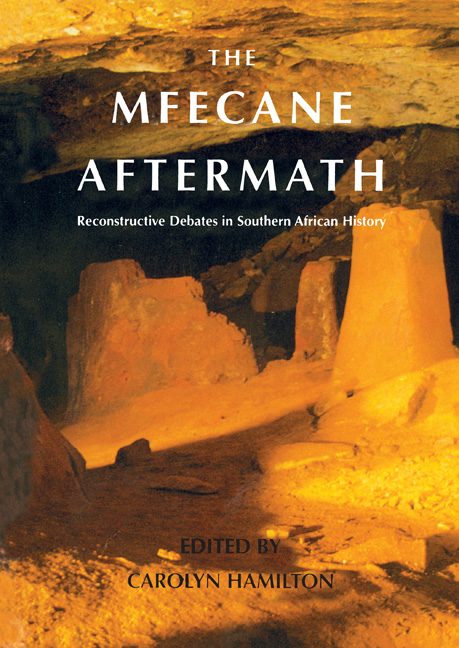Book contents
- Frontmatter
- Contents
- Maps
- Preface
- Acknowledgements
- Notes on Orthography and Names
- Contributors
- Introduction
- Part One Historiography and Methodology
- Putting the Mfecane Controversy into Historiographical Context
- 1 Pre-Cobbing Mfecane Historiography
- 2 Old Wine in New Bottles: The Persistence of Narrative Structures in the Historiography of the Mfecane and the Great Trek
- 3 Hunter-Gatherers, Traders and Slaves: The ‘Mfecane’ Impact on Bushmen, Their Ritual and Their Art
- 4 Language and Assassination: Cultural Negations in White Writers' Portrayal of Shaka and the Zulu
- Part Two The South-Eastern Coastal Region
- Part Three The Interior
- Glossary
- Abbreviations
- Bibliographer's Note
- Bibliography
- Complete List of Papers Presented at the Colloquium
- Index
3 - Hunter-Gatherers, Traders and Slaves: The ‘Mfecane’ Impact on Bushmen, Their Ritual and Their Art
from Part One - Historiography and Methodology
Published online by Cambridge University Press: 31 May 2019
- Frontmatter
- Contents
- Maps
- Preface
- Acknowledgements
- Notes on Orthography and Names
- Contributors
- Introduction
- Part One Historiography and Methodology
- Putting the Mfecane Controversy into Historiographical Context
- 1 Pre-Cobbing Mfecane Historiography
- 2 Old Wine in New Bottles: The Persistence of Narrative Structures in the Historiography of the Mfecane and the Great Trek
- 3 Hunter-Gatherers, Traders and Slaves: The ‘Mfecane’ Impact on Bushmen, Their Ritual and Their Art
- 4 Language and Assassination: Cultural Negations in White Writers' Portrayal of Shaka and the Zulu
- Part Two The South-Eastern Coastal Region
- Part Three The Interior
- Glossary
- Abbreviations
- Bibliographer's Note
- Bibliography
- Complete List of Papers Presented at the Colloquium
- Index
Summary
Julian Cobbing's critique of the notion of the ‘mfecane’ has, despite some criticism, provided a framework for the integration of what have been many different sectional histories of South Africa. But, because early accounts of South Africa's past have not yet been totally unloaded of prejudice and of the colonists’ legitimising ideologies, other myths and cultural stereotypes continue to act as alibis for present-day cultural divisionist policies. One such myth is the part played by various Bushman groups in the colonial history of southern Africa. If we are to abandon the ‘mfecane’ myth because of its role in legitimising the apartheid state, the new historical constructions of the period conventionally designated the ‘mfecane’ should take cognisance of all peoples present on the landscape at the time.
Here I challenge the once explicit, now implicit, view that ‘of the unlucky Bushman there is little for history to say’. Perhaps one of the reasons for this view having become implicit is that although some historians have already confronted the issue, they have not been able to develop an approach that reincorporates the Bushmen fully into southern African history. As a result many historians have ignored archaeological discourse and have tended to rely on cultural stereotypes. Nigel Penn, however, presents us with a notable exception in this regard for the western Cape. In this essay I advance a methodology that will allow us to restore the Bushman peoples to their rightful place not only in the events commonly known up until now as the ‘mfecane’ but also in the history of southern Africa.
The Bushmen in History
The Bushmen have been politically marginalised since the arrival of European colonists. The white settlers brought with them a specific set of European morals and standards, and it was against these that the Bushmen were seen and judged. Early writers forcefully convey these essentially conservative and racist attitudes. Missionaries in particular were scathing of the Bushmen: Robert Moffat and H. Tindall, for instance, were among many who emphasised what they considered to be a lacuna in Bushman life:
Hard is the Bushman's lot, friendless, forsaken, an outcast from the world, greatly preferring the company of beasts of prey to that of civilized man. His gorah soothes some solitary hours, although its sounds are often responded to by the lion's roar or the hyeana's howl.
- Type
- Chapter
- Information
- Mfecane AftermathReconstructive Debates in Southern African History, pp. 51 - 70Publisher: Wits University PressPrint publication year: 1995

